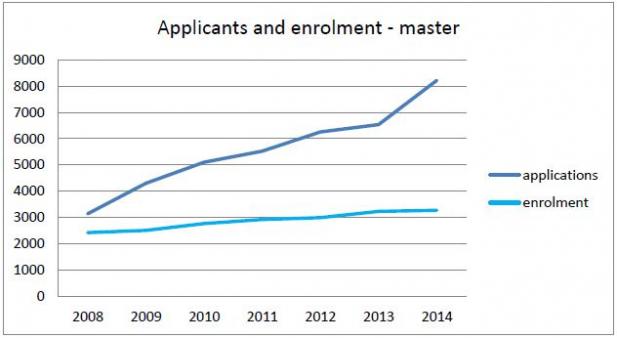CBS disappoints a lot of applicants for master programmes
By President of CBS Per Holten-Andersen
CBS has decided that we cannot admit more students, as we are at our full capacity. We have neither rooms nor teachers to expand the number of study places, and we do not have the means to appoint the professors and associate professors we need to offer more teaching.
A lot of Danish and international students wish to take a master degree at CBS, which is why we today see a lot of disappointment among recent bachelors from CBS and other universities. I have met students who are frustrated and even angry, but unfortunately it does not change our capacity or staff situation.

Regrettably, a lot of the applicants are not only disappointed, they are surprised too. A lot of students mistakenly assume that they are entitled to study any master programme, while others may have taken a look at the situation a few years ago, when it was much easier to gain access. Others think that they are entitled to a place in a programme if they meet the entry requirements.
Bachelors with a legal claim are always entitled to a place, but you only have legal claim to the master programme that naturally follows your bachelor programme, and only immediately after you have completed your bachelor degree. If you want to apply for another master programme than the one that naturally succeeds your bachelor programme, or if you have taken a break from your studies, you are, together with all other applicants who meet the entry requirements, part of the competition for a limited number of places.
Among these, the first thing we look at is whether you meet the entry requirements; typically completed courses within the core disciplines of the programme.
Those who meet the entry requirements compete on equal terms for the places, and the selection is based on an overall assessment of relevant courses and grades. We do not distinguish between students from different schools or countries, but select them on the basis of academic merits.
When you have been accepted into an MSc in Economics and Business Administration (EBA), which is one programme, you will meet yet another eye of a needle. You cannot be entirely sure to be accepted into the concentration you want the most, as the competition for the EBA programmes also has become more intense. This is because the MSc programmes have limited class sizes to a maximum of 120 out of pedagogical and capacity considerations. One of the ways we are able to meet this large amount of applications is by establishing one more finance concentration.
I find the ability to change course after a bachelor degree a quality of the educational system. This is also the idea behind the so-called Bologna model that divides all degree programmes into a bachelor and a master. Unfortunately, politicians do not share this vision in practice. Our limited resources imply that only a few students are able to change to the most popular CBS programmes. From next year, the study progress reform means that it will formally be harder to acknowledge other than the closely related bachelor programmes as a qualification.
We are delighted and proud of the confidence that a lot of young people show us by applying for our master programmes. This also means that we share in the huge frustration that a lot of rejected applicants have expressed. Regrettably, we are turning down a lot of qualified applicants, which is causing frustration to the individual applicant as well as CBS. However, with our limited financial resources we will not be able to ensure a high quality of our programmes if we admit more students. And that would simply not be good enough for us or our students.